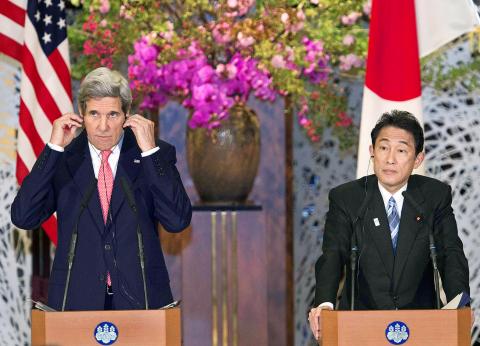US Secretary of State John Kerry yesterday stressed the US is willing to engage with North Korea as long as it takes steps to give up nuclear weapons.
He also vowed the US would protect its Asian allies against any provocative acts by the North, but said Washington wants a peaceful solution to tensions in the region.
“We are prepared to reach out, but we need [the] appropriate moment, appropriate circumstance,” Kerry said, adding that North Korea had to take steps toward giving up its nuclear programs.

Photo: REUTERS
“They have to take some actions. Now how many and how much I want to have a discussion with folks back in Washington [about] ... but they have to take action,” Kerry told reporters.
The North has threatened for weeks to attack the US, South Korea and Japan since new UN sanctions were imposed in response to its latest nuclear arms test in February. Speculation has mounted of a new missile launch or nuclear test.
“I think it is really unfortunate that there has been so much focus and attention in the media and elsewhere on the subject of war, when what we really ought to be talking about is the possibility of peace. And I think there are those possibilities,” Kerry earlier told a news conference in Tokyo after a meeting with his Japanese counterpart, Fumio Kishida.
Kerry was in Japan for the final stop on an Asian tour aimed at solidifying support for curbing North Korea’s nuclear program, and reassuring US allies.
Kerry said the US would “do what was necessary” to defend its allies Japan and South Korea, but added: “Our choice is to negotiate, our choice is to move to the table and find a way for the region to have peace.”
Kerry also sought to clarify his comments made in Beijing on Saturday, which some took to suggest he might be offering to remove recently boosted missile defense capabilities in Asia if China persuaded North Korea to abandon its atomic programs.
The Pentagon in recent weeks has announced plans to position two Aegis guided-missile destroyers in the western Pacific and a missile defense system to Guam.
“The president of the United States deployed some additional missile defense capacity precisely because of the threat of North Korea. And it is logical that if the threat of North Korea disappears because the peninsula denuclearizes, then obviously that threat no longer mandates that kind of posture. But there have been no agreements, no discussions, there is nothing actually on the table with respect to that,” Kerry said.

MAKING WAVES: China’s maritime militia could become a nontraditional threat in war, clogging up shipping lanes to prevent US or Japanese intervention, a report said About 1,900 Chinese ships flying flags of convenience and fishing vessels that participated in China’s military exercises around Taiwan last month and in January last year have been listed for monitoring, Coast Guard Administration (CGA) Deputy Director-General Hsieh Ching-chin (謝慶欽) said yesterday. Following amendments to the Commercial Port Act (商港法) and the Law of Ships (船舶法) last month, the CGA can designate possible berthing areas or deny ports of call for vessels suspected of loitering around areas where undersea cables can be accessed, Oceans Affairs Council Minister Kuan Bi-ling (管碧玲) said. The list of suspected ships, originally 300, had risen to about

DAREDEVIL: Honnold said it had always been a dream of his to climb Taipei 101, while a Netflix producer said the skyscraper was ‘a real icon of this country’ US climber Alex Honnold yesterday took on Taiwan’s tallest building, becoming the first person to scale Taipei 101 without a rope, harness or safety net. Hundreds of spectators gathered at the base of the 101-story skyscraper to watch Honnold, 40, embark on his daredevil feat, which was also broadcast live on Netflix. Dressed in a red T-shirt and yellow custom-made climbing shoes, Honnold swiftly moved up the southeast face of the glass and steel building. At one point, he stepped onto a platform midway up to wave down at fans and onlookers who were taking photos. People watching from inside

Japan’s strategic alliance with the US would collapse if Tokyo were to turn away from a conflict in Taiwan, Japanese Prime Minister Sanae Takaichi said yesterday, but distanced herself from previous comments that suggested a possible military response in such an event. Takaichi expressed her latest views on a nationally broadcast TV program late on Monday, where an opposition party leader criticized her for igniting tensions with China with the earlier remarks. Ties between Japan and China have sunk to the worst level in years after Takaichi said in November that a hypothetical Chinese attack on Taiwan could bring about a Japanese

The WHO ignored early COVID-19 warnings from Taiwan, US Deputy Secretary of Health and Human Services Jim O’Neill said on Friday, as part of justification for Washington withdrawing from the global health body. US Secretary of State Marco Rubio on Thursday said that the US was pulling out of the UN agency, as it failed to fulfill its responsibilities during the COVID-19 pandemic. The WHO “ignored early COVID warnings from Taiwan in 2019 by pretending Taiwan did not exist, O’Neill wrote on X on Friday, Taiwan time. “It ignored rigorous science and promoted lockdowns.” The US will “continue international coordination on infectious